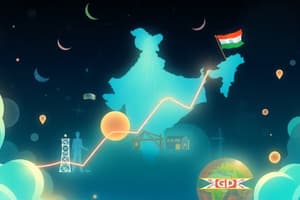Podcast
Questions and Answers
Explain the difference between economic growth and economic development.
Explain the difference between economic growth and economic development.
Economic growth focuses on the value of goods and services produced, while economic development considers the well-being of the population and includes factors like education and life expectancy.
How does economic growth contribute to development?
How does economic growth contribute to development?
Economic growth creates the foundation for development by generating resources to improve essential services, public infrastructure, and education.
Explain how investments in human capital and education can impact economic growth.
Explain how investments in human capital and education can impact economic growth.
Investments in human capital and education can contribute to economic growth by enhancing the skills and productivity of the workforce.
What does the Human Development Index (HDI) evaluate, and how does it differ from GDP growth?
What does the Human Development Index (HDI) evaluate, and how does it differ from GDP growth?
How can comparing GDP growth and HDI help us understand a country's development?
How can comparing GDP growth and HDI help us understand a country's development?
Explain the difference between economic growth and economic development.
Explain the difference between economic growth and economic development.
What does GDP measure, and how is it different from the Human Development Index (HDI)?
What does GDP measure, and how is it different from the Human Development Index (HDI)?
Why might a country experience high GDP growth without an improvement in the quality of life of its citizens?
Why might a country experience high GDP growth without an improvement in the quality of life of its citizens?
How does the Human Development Index (HDI) differ from GDP in terms of what they evaluate?
How does the Human Development Index (HDI) differ from GDP in terms of what they evaluate?
Explain why GDP growth alone may not indicate a higher quality of life for individuals.
Explain why GDP growth alone may not indicate a higher quality of life for individuals.
What are some of the factors considered by the HDI that are not captured by GDP?
What are some of the factors considered by the HDI that are not captured by GDP?
Study Notes
Understanding Economic Growth and Development: A Side-by-Side Comparison
Economic growth and economic development are two distinct yet intertwined concepts that help measure a nation's progress and well-being.
Economic Growth
Economic growth is typically defined as an increase in the production of goods and services within an economy over a given period, measured by the rise in gross domestic product (GDP). Factors contributing to economic growth include increases in capital goods, labor force, technology, and human capital.
Human Development Index (HDI)
In contrast, the Human Development Index (HDI) goes beyond economic growth to assess a country's capacity to provide a high standard of living and promote human well-being. HDI looks at factors such as life expectancy, education, and income to evaluate the quality of life for individuals.
GDP vs HDI
GDP is a single-dimension measurement of economic output, while the HDI considers multiple factors affecting an individual's well-being. GDP growth reflects the expansion of an economy, but it does not necessarily indicate a higher quality of life. For instance, a country may experience high GDP growth driven by an expanding workforce or increased spending, without addressing the distribution of wealth. The HDI, on the other hand, considers income distribution and the development of human capital, which are key factors for sustainable economic growth.
The Link Between Economic Growth and Development
While economic growth and development are distinct concepts, they are interrelated. Economic growth creates the foundation for development, as an expanding economy generates the resources needed to improve essential services, public infrastructure, and education. At the same time, development efforts, such as investments in human capital and education, can contribute to economic growth and improve the quality of life.
In conclusion, while economic growth focuses on the value of goods and services, economic development offers a broader perspective, considering the well-being of the population. The Human Development Index, by evaluating factors such as education and life expectancy, provides a more comprehensive view of a country's progress. Comparing GDP growth and HDI helps us understand the differences between economic expansion and holistic development.
Studying That Suits You
Use AI to generate personalized quizzes and flashcards to suit your learning preferences.
Description
Test your knowledge on the concepts of economic growth and development, and their differences. Explore the relationship between GDP and the Human Development Index (HDI) in assessing a nation's progress and well-being.



